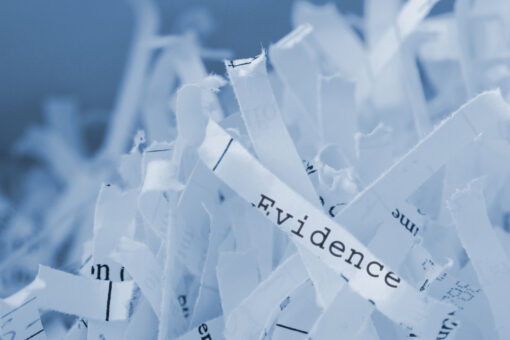
Evidence destruction is a minor offense, according to the majority of states’ penal codes and can be punished with fines or county jail time. Read on to learn more and contact Chambers Law Firm at 714-760-4088 if you are facing criminal charges.
When can you be accused of erasing or hiding evidence?
According to the majority of jurisdictions, you may be charged with evidence destruction if you knowingly and willfully destroy, modify, erase, or conceal “evidence” with the goal to stop it from being produced during a legal or court procedure.
What does the term “willful action” mean?
You normally commit an act “willfully” if you do it deliberately and/or with purpose. By this concept, there is always a defense to a charge of evidence destruction if the evidence was destroyed accidentally or unintentionally.
For instance, if you unintentionally threw away physical evidence, you probably won’t be charged with a crime. However, if you deleted or destroyed particular evidence with the intent to do so, you could be charged with a crime.
What is “evidence” according to the law?
Any thing or object that a party to a judicial case submits to support an allegation of fact is often referred to as “evidence.” Evidence may consist of the following: DNA, text messages, video recordings, emails, hard drives, automobiles, records, documents, and tangible items (like a murder weapon).
If you managed to destroy or erase something linked to an official proceeding that is not “proof,” you will not normally face a criminal charge.
Is the crime of obstructing justice the same as the destruction of evidence?
In general, no. In contrast to the crime of destroying evidence, many states define obstruction of justice as the offense in which you intentionally try to impede, delay, or prevent the authorities from receiving information, especially if the information relates to the commission of a crime.
Be aware, however, that certain states do not consider obstruction of justice as a distinct crime. In these jurisdictions, obstruction of justice may relate to the more precise actions of tampering with evidence, fabricating evidence, or hindering or resisting a police officer.
Can a criminal defense lawyer be of assistance?
Yes. It is advisable to obtain legal counsel from a law office or a criminal defense attorney if you are being investigated for allegedly destroying evidence. A defense lawyer can assist by ensuring that you are released on your own recognizance or bail after an arrest, representing you in court proceedings, applying for an expungement if you are found guilty of a crime, and assisting you in developing a legal defense to contest a criminal accusation.
Evidence destruction allegations are frequently defended by demonstrating that a factual error occurred, you were detained by the police without a good reason, or you did not obliterate evidence on purpose. You can contact Chambers Law Firm now at 714-760-4088 for a free legal consultation.




